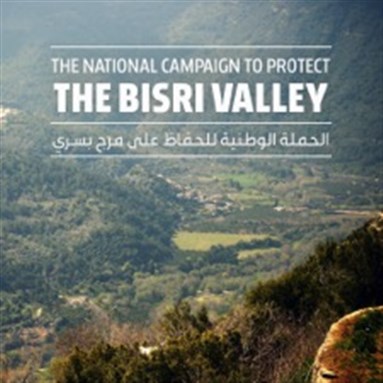On behalf of Lebanon Eco Movement, a network of 60 environmental NGOs, I am writing as the coordinator of The National Campaign to Protect the Bisri Valley to let you know of our major concerns regarding the World Bank-funded Bisri Dam in Lebanon.
If implemented, the dam will destroy one of the most important landscapes in the Middle East, devastating six million square meters of forests and agricultural lands, and dismantling more than fifty archeological and historical sites. The dam is also planned to be built on an active seismic fault, posing risks of reservoir-induced earthquakes. On top of the catastrophic social and environmental impacts, the project is based on an insufficient understanding of the water balance in Lebanon, and an incomplete consideration of alternatives, favoring expensive large-scale infrastructure instead of an integrated, environmentally conscious water management plan.
While the borrower (the Lebanese Government) claims to have conducted a “thorough” analysis of alternatives, their study relies on very old estimations of Lebanon’s water resources, dating back to the 1960s. It dismisses the recent, more relevant, water assessments that were conducted by the United Nations Development Program which confirm that “there is an overall surplus in the groundwater budget” (UNDP, 2014), and that the groundwater natural recharge amounts to 53 percent of the total renewable water resources. Providing water to Beirut’s population (including refugees) is therefore possible—and more efficient—through the reform of the groundwater sector, and the extraction of the nearby untapped aquifers.
Besides, The National Council for Scientific Research (NCSR) recommends the consideration of alternative solutions to supply Beirut with water given that the Karst-dominated Mount-Lebanon is geologically unsuitable for large dams (NCSR, 2015). According to the Council, the unavoidable water infiltration coupled with the seismic characteristics of the proposed dam locations will render surface storage both inefficient and dangerous. The failures of recently constructed dams in Mount-Lebanon confirm these findings (e.g. the failed dam in Dunniyeh).
The World Bank-funded(!) Strategic Environmental Assessment of the National Water Sector Strategy (SEIA) recommends the scaling-back of the dams’ program considering its social, economic, and environmental constraints. It describes the Bisri Dam as “land greedy,” and criticizes its unrealistic amount of resource exploitation. While the assessment classifies the dam as a “highest-regret” measure, it proposes less risky alternatives, many of which were not adequately studied in the borrower’s analysis of alternatives. In addition to groundwater, the SEIA proposes submarine springs as a viable alternative to consider. Qualitative and quantitative analysis of some of these springs have already been conducted by the NCSR, and yielded very positive results. An estimated 650 Mm3/yr of fresh water (six times the capacity of the Bisri Dam!) can help ensure water security for many years to come.
According to the World Bank’s social and environmental policies, the engagement of stakeholders, including communities, people affected by the projects, and NGOs, is a requirement for the approval of financing. However, the Bisri Dam’s public consultation records show that the overall attitude of all consulted audiences has been strongly opposed to the construction of the dam. People have been expressing disapproval of the compensation rates, the loss of biodiversity and productive lands, and the loss of jobs. Environmental NGOs were completely marginalized during the consultation process.
Based on the above, we ask the Board of Directors to take urgent action to withdraw the financing of the destructive Bisri Dam and support a sustainable water management plan instead. We believe that the World Bank’s commitments to the Sustainable Development Goals, if respected, can lead to considerable benefits to Lebanon and the region.
Finally, a recently launched international petitionasking the World Bank to withdraw the financing for the Bisri Dam has gathered more than 6,000 signatories so far.
Roland Nassour, Coordinator
The National Campaign to Protect the Bisri Valley
Lebanon Eco Movement
“Save the Bisri Dam” FB page: https://www.facebook.com/BisriValley/















